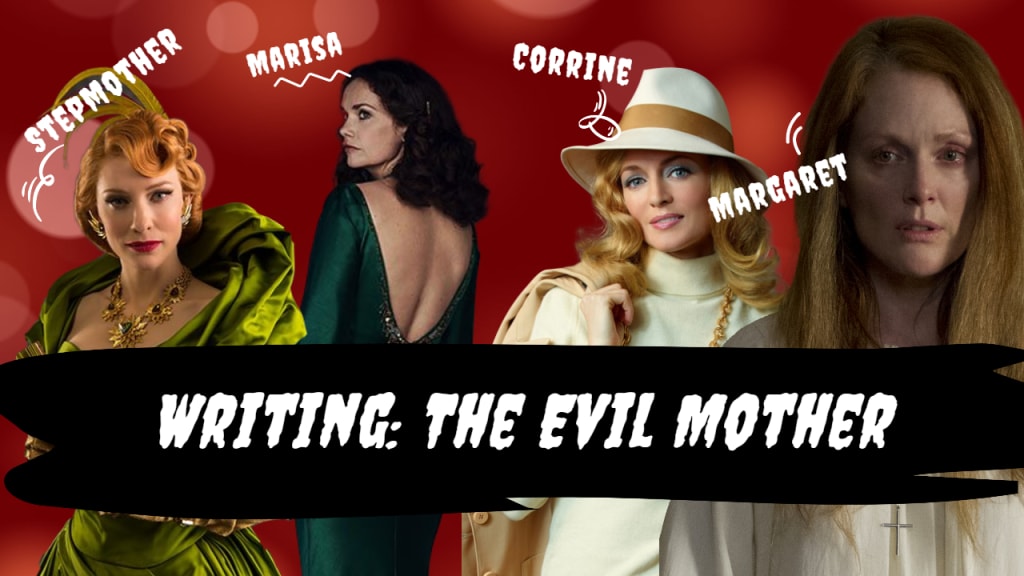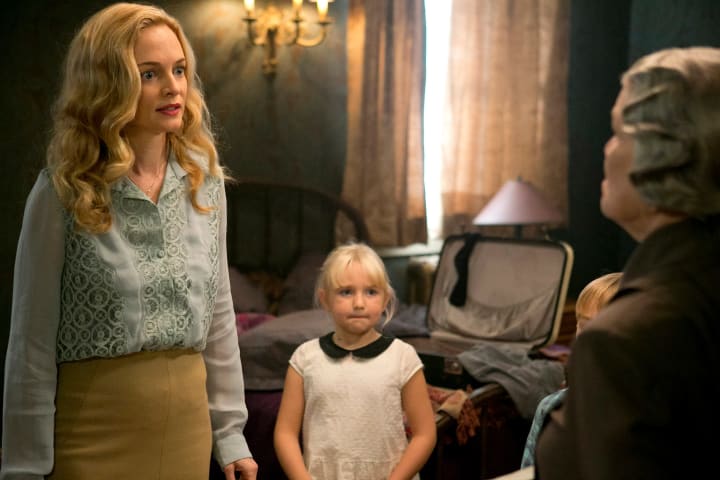
Since the beginning of storytelling, one trope has been recognised through fairy tales into adult fiction - an Evil or Wicked Mother. A mother is one of the most central figures that a character can have growing up, and her influence can have an impact on that character even as an adult. If the character is lucky, that mother will be a loving one - but in many cases, The mother figure is truly evil in a traditional sense, and is one of the worst villains one can face, especially if one of the Heroes or Love Interests is one of her children (or if she's married into his or her family as a stepmother).
Many such Evil Matriarchs are completely convinced that they, and only they, know what's best for their children, and can be very controlling, manipulative, and perfectly willing to do anything they deem necessary for their children's sake, no matter how evil or destructive it may be. Or the Mother can completely neglect her role as the parent altogether, with her selfishness leading to cruel and dangerous outcomes for her children.
To delve into how the Evil Matriarch archetype is portrayed on screen and written for a visual medium I will be analysing Cate Blanchett's Stepmother from Cinderella (2015), Ruth Wilson's Marisa Coulter from His Dark Materials (2019-), Heather Graham's Corrine from the Flowers in the Attic Anthology (2014-15) and Julianne Moore's Margaret White from Carrie (2013).
The Wicked Stepmother
This will be every writer's first real introduction to the Evil Mother role. Stepmother embodies the passive aggressive - and sometimes downright aggressive - resentment of her new partner's existing family before their marriage. This character has been played out many times across film, TV and literature - almost appearing cartoonish in how evil she is. The thing that stuck out with this version was how nuanced Cate Blanchett's portrayal was - yes, she captured the evilness of this role, but her abuse of Cinderella was grounded and felt real.
Stepmother makes her distain of Lilly James' Cinderella from the first scene and after her husband's death, she wastes no time in pushing Cinderella out of the family unit and into the servant role. Her abuse towards her stepdaughter in this adaptation is mental and emotional, but it's also a sign of her projecting her resentments of what Cinderella represents - someone who hasn't been broken by the harsh realities of life and always tries to be kind even to her.
Stepmother is also aware of the patriarchal society they live in, determining the only way for her daughters to thrive in this world is to marry for wealth and not love. Despite her scheming and manipulative skills, she is later enraged by Cinderella's ability to win the Prince's affections not by using these tactics - but by being her authentic self.
With the writing of this character, I interpreted this adaptation to be hinting that the Stepmother sees a version of herself through Cinderella - as in this girl represents a side to her she has had to suppress and even when she has achieved in creating a desirable version of herself and pushes that ideology onto her daughters, it is not enough. This comes boiling to the surface when she discovers the glass slipper Cinderella has been hiding:
Lady Tremaine : Are you looking for this? There must be quite a story to go with it. Won't you tell me? Hm? Very well, I shall tell you a story. Once upon a time, there was a beautiful young girl who married for love. And she had two loving daughters. All was well. But, one day, her husband, the light of her life, died. The next time, she married for the sake of her daughters. But that man, too, was taken from her. And she was doomed to look every day upon his beloved child. She had hoped to marry off one of her beautiful, stupid daughters to the prince. But his head was turned by a girl with glass slippers. And so, I lived unhappily ever after. My story would appear to be ended.
Throughout the entire screenplay, Stepmother has made her hatred of Cinderella abundantly clear - through the physical and emotional abuse she shows towards her stepdaughter and makes no secret of the fact her loathing is rooted in Cinderella's resemblance to her husband's first wife, but when finally confronted by these facts - she cannot bring herself to voice a justification or even a reason:
Cinderella : Why? Why are you so cruel? I don't understand it. I've tried to be kind to you.
Lady Tremaine : You? Kind to me?
Cinderella : Yes. And though no one deserves to be treated as you have treated me. Why are you doing it? WHY?
Lady Tremaine : Why? Because YOU are young, and innocent, and good, and I...
Even after all of this cruelty she has inflicted, Cinderella does the worst possible thing to a character like Stepmother. Her parting words to the woman who has treated her with nothing but contempt are simple but powerful - "I forgive you" and here is where we see Cinderella truly gets her peace of mind. Not by going all Brothers' Grimm and making her stepmother dance in shoes filled with hot coal till she dies (Snow White was a savage) - but by letting go and choosing to move on from her pain, something the Stepmother has never been able to do.

The Broken Mother
Philip Pullman's "Mother of all Evil" creation Mrs. Coulter - played terrifically by Ruth Wilson on screen. Like Stepmother, Marisa Coulter lives in a patriarchal society - only instead of relying on the "male gaze" to appear submissive, she uses her sexuality and manipulation to gain power and control over her male counterparts. For a large part of the series, she serves as a main antagonist.
Marisa is caught up in a scandalous and deadly affair with Lord Asrial and after the subsequent pregnancy of Lyra, she is forced to give up her baby and spends years trying to build up her social standing again. Although there is that maternal instinct in her, she demonstrates the unhealthy need for for control and obedience. There are also hints throughout the series - in both the books and TV series - that Marisa suffered an abusive childhood, which mirrors in how she initially responds to conflict with her own daughter. Instead of gaining obedience she expects, this abusive act causes Lyra to flee and causes a huge rift in their relationship.
The physical manifestation of her soul (a daemon) is a Golden Monkey - a beautiful creature who is mute and hides a terrible rage. This perfectly encapsulates a visual representation of Mrs Coulter's internal conflict, suppressing herself so much, she's muted apart of herself and brings out her own self-hatred.
In Season Two, Episode 5 (The Scholar), Mrs. Coulter crosses over into Will's universe, seeing a world where women have equal rights for the first time. Her guide Boreal patronisingly informs her that the people of Will’s world “appear to have more freedom,” but that the government is just as corrupt as the magisterium, and that consumerism rules in place of faith. And from a patriarchal point of view, this may well be true, but he cannot grasp how much Marisa feels the impact of seeing women able to pursue higher education, hold positions of authority, or balance work and motherhood - as when she observes a woman at a coffee shop typing on a laptop and entertaining a baby in a pram.
Marisa's whole world-view is shaken in this episode - as she sees what her life could have been as a woman and a mother if Boreal had shown her this portal years prior. She is rocked to her core after meeting Dr. Mary Malone. who assumes she is a scholar too and has authored papers of her work published - which she has, but only if a man takes credit in her world.
When she recounts this visit to Boreal, her façade slips when she reflects on how intelligent and free Malone is in this world. When Boreal continues to undermine how unjust her life has been as a woman, she starts lamenting that all the stories people tell of her and Asriel make her out to be a damsel and a victim - which she is anything but.
Marisa Broken Mother archetype is really delved into during this episode, especially when reunited with her daughter. In a scene that sees Lyra triggered by her mother's abuse, she lashes out - seeing Pan attacking the Golden Monkey, mirroring their last fight. But Marisa takes the pain - keeping tearful eye contact with Lyra, in a twisted way accepting the punishment she herself inflicted on her child. For Marisa, the scene is about showing how far she is willing to go in order to get what she wants, effectively severing her connection to her own daemon so that she can continue to focus on Lyra, abandoning him to Pan’s violence as he watches on in pain.

The Neglectful Mother
V.C. Andrews' Corrine is a woman who rejects her motherly instincts for money and a life of riches - while her children suffer abuse and starve in an attic. Corrine is shown to need a man to lean on, at first she is not independent and is naturally a very selfish person - in her own words "Look at me, I'm an ornament. The only thing I was really good at was being pretty".
When her husband - the sole-breadwinner of the family in a fatal car crash and as a last resort, she returns to her parents who are elderly and strictly religious millionaires residing in a grand estate named Foxworth Hall. Corrine lacks the agency and confidence to raise four children independently, we repeatedly see her embracing a damsel role despite her flawed actions - her victim-complex shines through.
However, Corrine's parents had previously disowned her as the four children are products of incest, so in the following months she conspires with her old mother Olivia, to keep her adolescent children hidden away in the mansion's spacious attic so no one would learn about the family's dirty little secret. Corrine locks her children away in isolation with the attic as their playground, while their grandmother verbally and physically abuses them, all while Corrine tries to persuade her bedridden father, to love and accept her again and add her back into his will. Thus, securing her financial future as she will inherit her father's fortune. Corrine promises her children that the situation is only for a short while and that they will be freed from the attic, once their grandfather passes away as it is implied he is dying from a terminal illness, and should not be alive much longer.
At first, she does the best she can to help her children adjust to their new surroundings, including attending secretarial school to gain skills necessary for a job to be able to support her children and giving them endless gifts, but she soon leaves them for over a month and returns a married woman - fulfilling that need for a man to take care of her, but she makes no plans to tell him about her children. This is where we see Corrine start to pull away from the mother archetype, finding comfort in her new role as the trophy wife to a handsome and younger lawyer.
Her façade continues to slip, till she completely rejects any love she had for her children and plots to poison them. Once her surviving children escape her clutches, Corinne finds her life empty and meaningless with all her newfound money and wealth. The guilt consumes her, but she can't let go of her riches. Corrine is an example of writing a villain who constantly sees herself as a victim, never taking responsibility until the damage is beyond repair.

The Religious Fanatic Mother
Stephen King's Margaret White is the opposite of these prior examples - while some use their sexuality for agency or gaining back control, Margaret resents it and any form of womanhood. She has an unhealthy relationship with Christianity, practicing her own twisted version of it
One could look at this through two lens - Margaret has a traumatising relationship with motherhood because of her own upbringing or because her daughter was the result of a rape, she projects these traumas onto her child. Her viewpoint on women is narrow-minded and clouded in sexism.
Yet unlike the past reincarnations of this religious fanatic, Julianne Moore's portrayal has the most characteristic traits associated with motherhood. Perhaps the biggest difference between this depiction of Margaret and the earlier versions is how much she genuinely loves Carrie. In neither of the previous films nor the book did Margaret ever say "I love you". Meanwhile, in the 2013 movie, during almost every scene, she expresses how much she loves Carrie - either through her guilt after her cruel punishments or her moments of genuine affection.
This version shows Margaret knowing about Carrie's powers, her awareness of it giving a complexity she did not have in previous adaptations. In a deleted scene which depicted the first chapter of the book where young Carrie is berated for talking to a teenage neighbour - while little Carrie cries, Margaret notices the hail falling because of it and tries to calm Carrie, soothing her with "God forgives you" and rushes her inside to protect her from the rain.
Even in her final moments, when she is about to kill Carrie she does not want to - there is genuine remorse but she feels like she has to, in order to protect Carrie from things that she believes would be far worse - her classmates' ridicule, from being violated by males (as Margaret herself was, when martially raped), and especially from God's judgment. In fact, her abusiveness comes precisely from the fact that she does love her daughter so much and wants to do anything to protect her from harm. This screenplay depicts a more humane and complex version of Margaret, contrasting with the 1976 Margaret ( Piper Laurie) especially who seemed to take pleasure in abusing Carrie, even laughing and smiling as she did so.

Looking back at all these examples, it proves a writer can subvert the mother archetype - going dark and in many cases, making her the villain of the piece. The thing to remember though, you need to know why she is the antagonist in your story. No one wakes up one day and decides to be evil - it takes many actions, choices and people that shapes who these women later become Your job as the writer is to give the Evil Mother as much depth and complexity as you would give your protagonist.






Comments
There are no comments for this story
Be the first to respond and start the conversation.